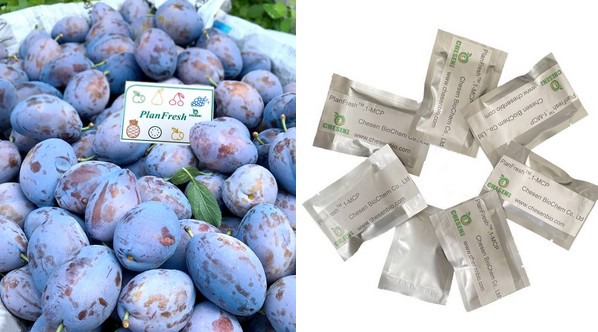Tropical fruits such as mangoes and avocados are typical examples of fruits that change as a result of respiration. During the climacteric phase the respiration process is up to 35 times more efficient. Temperate climate fruits such as plums are also climacteric fruits, and although the respiration process only doubles in efficiency during this phase, that still has a major impact on the ripening process.

Cathy is the sales manager of Chesen BioChem, a 1-MCP supplier from China. She first explained the fruits’ ripening process: during the climacteric phase fruits release large amounts of ethylene, which is one of the main elements that speeds up the ripening process. That is why climacteric fruits need to be kept in isolation. The ripening process of non-climacteric fruits is quite lengthy. As long as the fruit is protected from outside influences (for example, packing them together with climacteric fruits), then the product quality will not easily deteriorate for a long time. When the respiration process begins, the cells in the fruit receive the instruction to immediately speed up the ripening process, and the levels of biological enzymes rapidly increase.”
“Some enzymes are responsible for the breakdown of the original color pigments, and for the composition of new color pigments. That is how plums turn the color that indicates their ripeness. Some enzymes are responsible for speeding up the breakdown of acidic elements. They remove the sour flavor of plums. Others stimulate starch hydrolysis to create a sweet flavor. Yet other enzymes break down pectin to soften the plums,” Cathy explains.
“All of these reactions first ripen the plum, but if they continue, they cause the plum to rot. To the naked eye it seems as if a perfectly ripe plum suddenly rots overnight. The process can take place incredibly fast, in only a few days the plum is spoiled.”
According to Cathy, the peak period of the respiration process is when fruit turns from ripening to rotting and ethylene plays an incredibly important role in this process. “That is why ethylene inhibitors can slow down the ripening process. One of the most important ethylene inhibitors, 1-MCP, is already used to control the ripening process in plums and improve their product quality and ability to endure storage. 1-MCP treatment delays the impact of ethylene production in the fruit itself on the respiration process. In this way, 1-MCP treatment delays the softening of plums and the color changes. The firm plums are better able to endure storage and transport.”
“Our PlanFresh post-harvest fresh-keeping solutions are based on a kind of 1-MCP technology for fruits, vegetables, and flowers. PlanFresh can extend the period plums endure in storage or long distance transport. Plums require an early harvest, post-harvest disinfection, low temperatures, and air drying,” Cathy said.
“The plums should quickly enter a container after the harvest, where the plums are pre-cooled for 12-24 hours to temperatures below 20℃, and then entered into storage. Quick treatment with PlanFresh 1-MCP in storage helps to effectively extend the shelf life of plums. When the plums are taken from storage to be prepared for retail, they are brought to temperatures between 18~24 to restart the respiration process and stimulate the sweet fragrance that is so characteristic of plums. This method, however, is not easy because some plum varieties are quite sensitive to low temperatures.”
“The ongoing pandemic has caused huge backlogs in many ports where containers full of fruit are delayed for days on end. PlanFresh can help extend the shelf life of fruits and thus reduce financial losses for crop growers, packers, shippers, retailers, and consumers.”
Chesen BioChem has the license for selling their products in China. “We worked hard to supply high-quality agricultural chemicals for post-harvest treatment, and actively promote the registration of plant hormones abroad. We are now looking for strategic partners with an interest in retailing PlanFresh and other agricultural chemicals.”
For more information:
Cathy/Chesen BioChem
Tel.: +86 18133609421
E-mail: sales@chesenbio.com
Website: www.chesenbio.com

